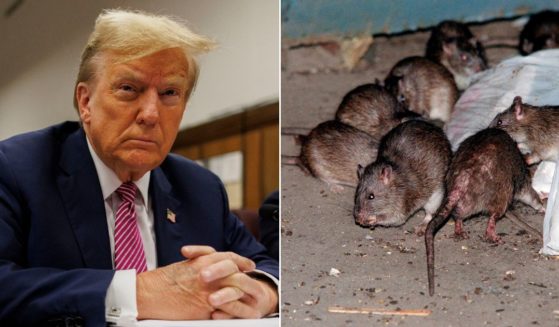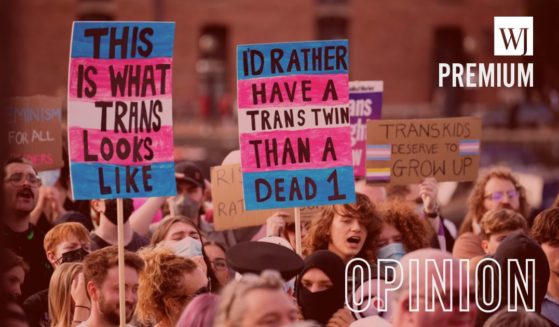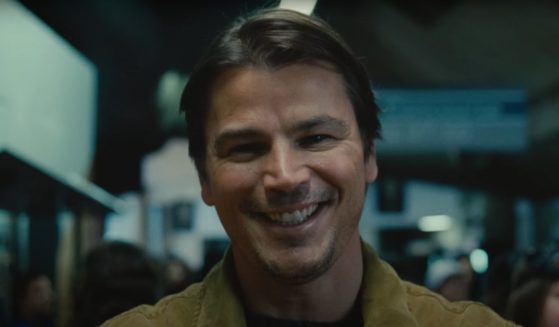RFK's Speech Following the Death of Martin Luther King Was So Powerful It Reputedly Saved Indianapolis from Riots
Fifty-three years ago, Robert Kennedy delivered a speech in Indianapolis that — like Abraham Lincoln’s Gettysburg Address — transcends time and offers lessons for those who seek a newer world.
The sad occasion of Kennedy’s remarks was the assassination of Dr. Martin Luther King, Jr., on April 4, 1968, in Memphis earlier that evening.
Riots and protests erupted in cities around the country (similar in some ways to last summer) as news spread of the 39-year-old’s murder.
In Washington, D.C., National Guard troops were called in to surround and protect the U.S. Capitol, as journalist Jack Newfield reported in his 1969 book “Robert Kennedy: A Memoir.”
In fact, violence and looting broke out in 76 American cities, prompting the call up of 70,000 troops and guardsmen to restore order.
Nearly 50 people were killed in the burning and mayhem and another 2,500 were injured, according to Newfield.
However, unlike other major cities like Chicago, Detroit and Baltimore, there was no violence in Indianapolis — and many have credited this to the remarks Robert Kennedy gave that night.
Larry Tye, in his book “Bobby Kennedy: The Making of a Liberal Icon,” reported that both the Republican mayor of Indianapolis, who would later become U.S. Sen. Richard Lugar, and the city’s chief of police told RFK not to come, fearing for his safety and the city’s.
Kennedy — who was seeking the Democratic presidential nomination and had been scheduled to campaign in a predominately black area of Indianapolis that night, prior to the news of MLK’s death — responded, “I’m going to go there … and that’s it.”
As with Lincoln’s Gettysburg Address, Kennedy’s remarks were short and full of pathos.
“I have some very sad news for all of you, and that is that Martin Luther King was shot and was killed tonight in Memphis,” he said.
Gasps and cries of shock could be heard among the predominantly African-American crowd of perhaps 1,000 people.
“Martin Luther King dedicated his life to love and to justice between fellow human beings. He died in the cause of that effort,” Kennedy continued.
King envisioned an America, as articulated in his famous 1963 “I Have a Dream” speech, that would “rise up and live out the true meaning of its creed: ‘We hold these truths to be self-evident, that all men are created equal.'”
“I have a dream that my four little children will one day live in a nation where they will not be judged by the color of their skin but by the content of their character,” the Baptist preacher said.
“And if America is to be a great nation, this must become true. So let freedom ring,” King proclaimed.
Like King, Kennedy in his speech in Indianapolis appealed to the better angels of Americans’ nature and called on them to take stock in where the country was as together they traveled through the tumultuous late 1960s, marked by anti-Vietnam War and racial protests.
“In this difficult day, in this difficult time for the United States, it’s perhaps well to ask what kind of a nation we are and what direction we want to move in,” he said.
“For those of you who are black — considering the evidence there evidently is that there were white people who were responsible — you can be filled with bitterness and with hatred and a desire for revenge. We can move in that direction as a country, in greater polarization — black people amongst blacks, and white amongst whites, filled with hatred toward one another,” Kennedy observed.
“Or we can make an effort, as Martin Luther King did, to understand and to comprehend and replace that violence — that stain of bloodshed that has spread across our land — with an effort to understand with compassion and love.”
Kennedy then shared that he too knew the pain of losing someone dear to him, referring to his brother former President John Kennedy’s assassination four-and-a-half years prior.
“For those of you who are black and are tempted to be filled with hatred and distrust of the injustice of such an act, against all white people, I would only say that I can also feel in my own heart the same kind of feeling. I had a member of my family killed, but he was killed by a white man,” he added.
Kennedy went on to quote from his favorite Greek poet Aeschylus, who wrote, “Even in our sleep, pain which cannot forget falls drop by drop upon the heart until, in our own despair, against our will, comes wisdom through the awful grace of God.”
In other words, the then-New York senator was saying he had traveled through the valley of the shadow of death and despair and found peace and grace along the way.
“We can do well in this country. We will have difficult times, we’ve had difficult times in the past and we will have difficult times in the future. It is not the end of violence; it is not the end of lawlessness; it is not the end of disorder,” Kennedy said.
“But the vast majority of white people and the vast majority of black people in this country want to live together, want to improve the quality of our life and want justice for all human beings that abide in our land.”
Amen. Sports commentator and former NBA star Charles Barkley made a similar point on air last week.
Charles Barkley dropping a truth bomb about the racial division driven by politicians! ? pic.twitter.com/phd7s1s1io
— Madison Gesiotto Gilbert (@madisongesiotto) April 4, 2021
“I think most white people and black people are great people. I really believe that in my heart,” Barkley said.
RFK, after speaking for approximately five minutes, closed his remarks — encouraging the crowd to go home and say a prayer for Dr. King’s family and for the country.
They left and there was no violence.
Mike Riley, the head of Kennedy’s presidential primary campaign in Indiana, recounted to WFYI-TV in a 2018 interview how real the moment was when the candidate spoke.
“You could tell it wasn’t written by any speechwriter, and he spoke from his heart,” Riley said.
Former Indiana state Rep. Bill Crawford, who was in the crowd that night, recalled the powerful impact Kennedy’s speech had on him.
“If there was going to be an angry reaction, if there was going to be someone who would strike the match, it would have been those of us that were the young ‘radical’ activists,” Crawford said. “And the tenor of his remarks — the sincerity of his remarks — dampened our anger.”
“The stars were aligned, and we believe that God’s hand was in it that night,” he added.
Lugar explained, “Obviously there was no way that you could predict how things were going to come out.”
“Robert Kennedy’s speech, which has been shown for many, many years, [was] a magnificent speech, not only under the circumstances but under any circumstances,” he said.
A memorial depicting Kennedy and King reaching toward each other is at the site where RFK delivered his remarks.
Robert Kennedy 53 years ago today in Indianapolis:
“In this difficult day, in this difficult time for the United States, it’s perhaps well we ask what kind of a nation we are and what direction we want to move in.” pic.twitter.com/FhHw2Az0Cf
— Andrew Smith (@AndrewSmithNews) April 4, 2021
On the 50th anniversary of the speech in 2018, then-President Donald Trump signed into law legislation designating the location the Kennedy-King National Commemorative Site.
Truth and Accuracy
We are committed to truth and accuracy in all of our journalism. Read our editorial standards.












